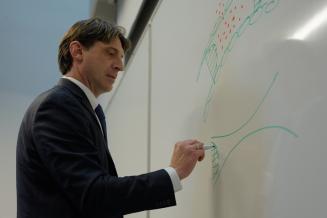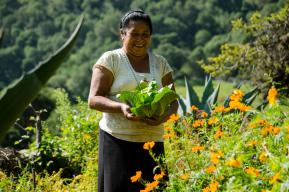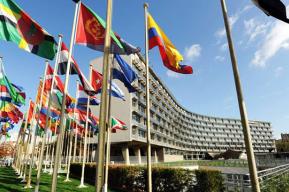Professor Mohamed Ali Farag from Egypt, Dr Jie Qiao from China and Dr Triantafyllos Stylianopoulos from Greece have all made an important contribution to medicine. They are this year’s laureates of the annual UNESCO–Equatorial Guinea International Prize for Research in the Life Sciences. They received their prize on 23 April, at a ceremony being held in Addis Ababa, Ethiopia, on the margins of the tenth Africa Regional Forum on Sustainable Development. Each laureate has been awarded almost US$117 000.
This prize rewards outstanding research that has contributed to improving the quality of human life. The life sciences offer an enormous potential for medical progress but also for more responsible management of our natural resources.

Prof. Mohamed Ali Farag
Pharmacognosy Department, Faculty of Pharmacy, Cairo University

Prof. Farag is a specialist of metabolomics and one of the pioneers in this field in Africa. He assesses changes in the composition of a metabolite present within a cell, an organism or a tissue. For instance, after a person eats anything, the body starts converting this food into energy. This chemical process of digestion produces other chemicals. Our bodies are constantly taking molecules apart and reassembling them in new combinations, producing metabolites which, in turn, influence our state of health.
Prof Farag has developed a metabolomic platform which is the first of its kind. This platform enables scientists to observe volatile compounds emitted by microbes for both medical and agricultural applications. Understanding the microbial world better will be vital to tackling growing microbial resistance to antibiotics, which is creating ‘superbugs’. Farag's seminal work in agrochemical discovery using metabolomics has already aided in identifying novel biocontrol agents from soil bacteria that can boost plant growth.
Dr Farag's research stretches across different biological systems. He is interested in analysing herbal medicines for proof of efficacy and in studying their interaction with the human body. For instance, he is studying how gut microbiota inside our body interact with the bioactive compounds produced by plants (phytochemicals) to determine the ultimate effect of such interaction on the human body and the role that this interaction plays in disease prevention.
Dr Jie Qiao
Executive Vice-President of Peking University and Director of Peking University Health Science Center

A specialist of reproductive medicine, Dr Qiao has expanded our grasp of the mechanisms behind fertility – and infertility. She has studied the detailed genetic processes in humans that lead from germ cell to reproductive cell then to embryo and was the first person to publish maps of these processes. She has also developed innovative techniques for preimplantation genetic diagnosis, a procedure that can dramatically improve the success rate of in vitro fertilization (IVF) and help avoid the transmission of genetic diseases through IVF.
Perhaps one of her most revolutionary contributions to improving women’s reproductive health has been her discovery of the role that the microbiome in the gut plays in female reproductive disorders. The human gut hosts bacteria, viruses, fungi and other micro-organisms which are collectively known as the microbiome. In a healthy gut, there is a balance between beneficial and harmful micro-organisms. This balance is essential for maintaining a healthy immune system. Dr Qiao’s discovery has fostered the novel concept of the ‘gut-based intervention for reproductive diseases’. By linking infertility to a patient’s unique microbiome, her work has propelled precision medicine into the realm of reproductive health.
Beyond these endeavors, Dr Qiao is committed to sharing scientific data by establishing publicly shared databases. In 2021, she was lead author of a Lancet Commission report on 70 years of women’s reproductive, maternal, newborn, child and adolescent health in China, along with over 30 other domestic and international collaborators, which is available in open access.
Dr Triantafyllos Stylianopoulos
Head of Cancer Biophysics Laboratory, Mechanical and Manufacturing Engineering, University of Cyprus

Dr Stylianopoulos is spearheading research into cancer therapies. His team's innovative approach focuses on remodelling the micro-environment in which the tumour evolves – a key factor in the rate of progression of cancer – to improve the delivery and efficacy of cancer treatments for patients who face the grim prognosis of solid tumours. His laboratory is tackling one of the most challenging aspects of oncology, namely, the stroma, the supportive tissue around such tumours. By first understanding then altering this micro-environment, Dr Stylianopoulos has managed to enhance the penetration and distribution of therapeutic drugs.
His research leverages the principles of biomechanics, blending physics and biology. His team is striving to understand how the mechanical forces which play a critical role in the progression of a tumour and its resistance to treatment can be manipulated to open up new pathways for drug delivery.
Through collaboration with global pharmaceutical entities, Dr Stylianopoulos plans to translate his findings into therapies that can be evaluated and, eventually, utilized to provide better care for cancer patients.
About the prize
Established in 2008, the annual UNESCO–Equatorial Guinea International Prize for Research in the Life Sciences rewards scientific research that advances sustainable development. The prize consists of US$350,000, which is shared between the laureates.
About the Jury
The Jury consists of the following members:
- Chair: Professor Wagida Anwar (Egypt)
- Deputy Chair: Professor Vincent P.K. Titanji (Cameroon)
- Member: Professor Constantinos Phanis (Cyprus)
- Member: Professor Indrani Karunasagar (India)
- Member: Professor Pathmanathan Umaharan (Trinidad and Tobago)










